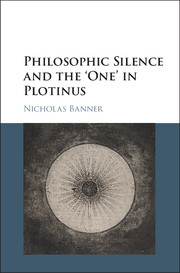Book contents
Introduction
Published online by Cambridge University Press: 16 March 2018
Summary
Plotinus has only one thing to say … and yet, he never will say it.
Hadot, 1993The present study is an enquiry into ‘philosophic silence’ in Plotinus. The line of enquiry pursued arose from wonder at a seeming paradox: Plotinus posits a radical truth available to the philosophic seeker, a truth that is an ontological transformation as much as it is an epistemological attainment, but refuses to speak this truth, and denies that it may be spoken. Why, then, write about it? The ineffable nature of the One or Good for Plotinus, coupled with what may be termed its transcendence and immanence at all levels of being and knowing, naturally gives rise to this tension between utterance and silence.
Plotinus also positions himself as an exegete of an esoteric philosophic tradition, with a concern for keeping certain philosophic matters out of the hands of the vulgar crowd. He claimed a great reluctance to write and publish his philosophy. Yet publish he did, as well as teaching a philosophic seminar open to all, and to questions from every quarter. How should we account for these apparent contradictions?
The most common account of Plotinus’ use of the intensive negative language known as apophasis, of the rhetorics of silence and secrecy and of the paradoxes of transcendence and immanence, is that all these techniques are legitimate philosophical responses to the ineffable first principle of later Platonism. Viewed from the perspective of the philosophic history of ideas, Plotinian paradox and indeed what is widely termed Plotinian ‘mysticism’ arise from Middle and Late Platonist hermeneutics of Platonic premises, and are simply logical. Since the publication in 1928 of Dodds’ seminal ‘The Parmenides of Plato and the Origin of the Neoplatonist One’, the dominant tendency in Classical scholarship has been to regard the rise of the transcendent first principle in Platonism, and particularly in Plotinus, as an outcome of exegesis primarily of the Platonic dialogues and secondarily of other Greek philosophical materials, particularly of Aristotle and the commentary tradition. The intellectual history which has emerged, painted in broad strokes, describes a more or less linear progression toward an idea of a first principle which, whether it is an intellect, a monad, or something else, surpasses being and essence.
- Type
- Chapter
- Information
- Philosophic Silence and the ‘One' in Plotinus , pp. 1 - 16Publisher: Cambridge University PressPrint publication year: 2018



